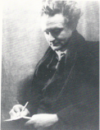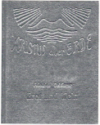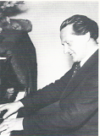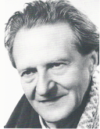Let us…
In the first words of the Act of Consecration of Man a task is expressed that can stay with us for the rest of our life. You can make a beginning with it when before the service you look around: with whom will we fulfill the Act of Consecration of Man? Who are meant with the little word “us?” Can I in some way take those present along in this great prayer? That becomes more difficult when someone is present for whom we feel antipathy, or perhaps even worse than that. But such a person also forms part of the Act of Consecration of Man. Even for our enemies and for those who persecute us do we have the task to pray (Matthew 5:44).
In the course of the Act of Consecration the circle of the community with whom we pray opens out. All Christians and all who have died may participate in the offering. Whenever we feel together with a soul who has died, who offers with us on the other side of the threshold, we begin to experience that not only this one, but countless deceased souls want to participate in the altar service. Even when a few people are praying, it may be “full” at the altar. That is why the text of the Act of Consecration says: “… all who have died.”
In the last part the altar service opens itself once more for the word “us.” The communion speaks not only about us the living, about Christians, and those who have died, but about the life of the world. Eight times the word “world” sounds in this part. The peace of Christ is meant for the life of the entire world. The Act of Consecration of Man is so great that we can include everyone and everything in this prayer. Christ does not want to redeem a small select group, but the whole world. However, He cannot do this alone. Our Christian Community may in the coming century and centuries perhaps remain an insignificant small movement, but the Act of Consecration of Man can also in a community of a few persons grow to infinity.
Christ needs our prayer. May the word “us” grow forever and encompass all—all who are present, all true Christians, all who have died, until eventually the world has become part of our prayer. Thus we can help Him to bear and order the life of the world.
-Rv. Bastiaan Baan, October 2022

 A heart defect saved him from military service in the First World War. Ever since his confirmation, he had fainting spells and attacks of weakness, such that he fell down as if lifeless. Breathing exercises increased such conditions even more. He had to stay away from school for three-quarters of a year. How he loved the holiday visits to relatives in Radolfzell and Überlingen am See and the visits to Uncle Alfred, who was a district court judge in Karlsruhe and once showed him Rudolf Steiner’s Occult Science with the remark: “Nonsense personified.”
A heart defect saved him from military service in the First World War. Ever since his confirmation, he had fainting spells and attacks of weakness, such that he fell down as if lifeless. Breathing exercises increased such conditions even more. He had to stay away from school for three-quarters of a year. How he loved the holiday visits to relatives in Radolfzell and Überlingen am See and the visits to Uncle Alfred, who was a district court judge in Karlsruhe and once showed him Rudolf Steiner’s Occult Science with the remark: “Nonsense personified.” The Freiburg Community Chronicle and the records of Johanna Doldinger describe in detail the development of community life year by year. Friedrich Doldinger immediately began to travel in his area of influence, which included Baden and Switzerland. He held lectures and musical-poetic celebrations throughout the area. From a distance, he witnessed the Goetheanum fire on New Year’s Eve 1922/23. During the 1923/24 Christmas Conference, he was present in Dornach as far as his priestly duties allowed. Friedrich Doldinger had done much for the Anthroposophical Society. Rudolf Steiner is said to have asked him if a house for the Anthroposophical Society together with The Christian Community could be built in Freiburg.
The Freiburg Community Chronicle and the records of Johanna Doldinger describe in detail the development of community life year by year. Friedrich Doldinger immediately began to travel in his area of influence, which included Baden and Switzerland. He held lectures and musical-poetic celebrations throughout the area. From a distance, he witnessed the Goetheanum fire on New Year’s Eve 1922/23. During the 1923/24 Christmas Conference, he was present in Dornach as far as his priestly duties allowed. Friedrich Doldinger had done much for the Anthroposophical Society. Rudolf Steiner is said to have asked him if a house for the Anthroposophical Society together with The Christian Community could be built in Freiburg.

 Doldinger had a hard time with ‘Stuttgart,’ with the movement leadership, to which he himself belonged. It was not in him to hold meetings or attend conferences, although he took his leadership responsibility very seriously. He had to be effective himself and did so intensively for fifty years. For him, the source was the lived unity of knowledge, art, and religion. When he once thought it necessary, he wrote to all his colleagues: “If a strong and heartfelt devotion to anthroposophy were cultivated among us, exhortations to conscientiousness would be superfluous, as would the need for slogan-like declarations of will.”
Doldinger had a hard time with ‘Stuttgart,’ with the movement leadership, to which he himself belonged. It was not in him to hold meetings or attend conferences, although he took his leadership responsibility very seriously. He had to be effective himself and did so intensively for fifty years. For him, the source was the lived unity of knowledge, art, and religion. When he once thought it necessary, he wrote to all his colleagues: “If a strong and heartfelt devotion to anthroposophy were cultivated among us, exhortations to conscientiousness would be superfluous, as would the need for slogan-like declarations of will.”
 More than two decades of intensive work followed. This is a miracle in view of his persistently weak health, and only possible because of the glowing fire in his spirit and will that he forged. In his old age, many smiled at him as an oddball. It was not easy for colleagues who nevertheless, needed to work with him.
More than two decades of intensive work followed. This is a miracle in view of his persistently weak health, and only possible because of the glowing fire in his spirit and will that he forged. In his old age, many smiled at him as an oddball. It was not easy for colleagues who nevertheless, needed to work with him.